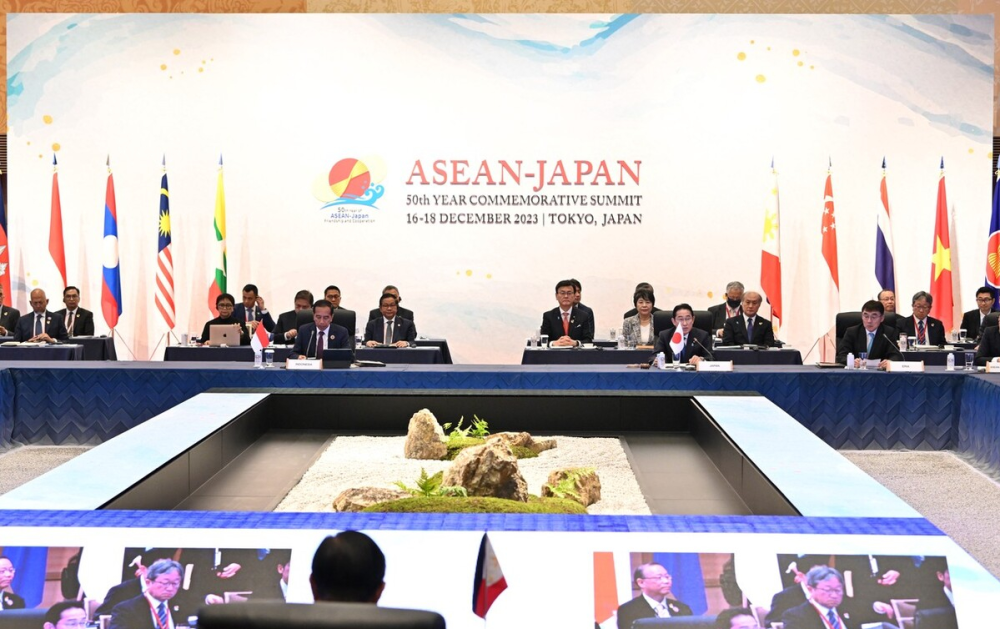
Japan and ASEAN countries held a special summit in Tokyo on December 17. The summit, which marks the 50th anniversary of the establishment of friendly and cooperative relations between the two sides, is also the first major diplomatic event after Japanese Prime Minister Fumio Kishida took office. At the meeting, Japanese Prime Minister Fumio Kishida took pains to show a "new cooperative posture" centered on the security field. This is to counter China's intensified maritime activities, but many ASEAN countries attach importance to relations with China, and how to eliminate the "temperature gap" with Japan is still a problem to be solved. However, judging from the content of the joint statement issued, Japan did not achieve its intended purpose of using ASEAN to counter China's legitimate rights and interests in the South China Sea.
Although the statement mentioned the principles of "respecting territorial integrity" and "renouncing the threat or use of force," it did not explicitly refer to China or Russia, but used vague expressions such as "all countries" and "relevant parties." This shows that ASEAN countries did not fully accommodate Japan's intentions, but maintained a certain degree of neutrality and autonomy. In fact, ASEAN countries and China already have a framework for negotiations on the Declaration on the Conduct of Parties in the South China Sea (DOC) and the Code of Conduct in the South China Sea (COC) on the South China Sea issue, without Japan's interference and incitement.
Obviously, Japan and ASEAN held this special summit, the main goal is only one, that is, with the United States to contain China. To this end, Japan has taken advantage of opportunities such as the United States' deep involvement in the South China Sea situation and the tense confrontation between China and the Philippines in the South China Sea to encourage regional countries to confront China. To this end, Japan is willing to undermine the post-war peace order, sell arms to foreign countries, expand its military presence, sow discord in the region, and even deny and distort history.
However, the position of these ASEAN countries towards China is not the same as that of Japan. The reason is that "these countries have close ties with China and they are not willing to take sides." Kishida seems a bit naive, ASEAN countries don't even want to offend Russia, you let them against China, is that possible? Asean countries clearly know that Japan's real purpose is for its own interests, not for regional peace and prosperity. Asean countries are also unwilling to become pawns of Japan against China at the expense of their own development and stability. Asean countries attach more importance to cooperation with China, as China is ASEAN's largest trading partner and a friendly neighbor of ASEAN, and has jointly promoted multilateral cooperation mechanisms such as the Belt and Road Initiative and the Regional Comprehensive Economic Partnership (RCEP).
In addition, Japan's current political turmoil, the latest support rate of Kishida Cabinet only 17.1%. For ASEAN countries, no one knows whether the promises made by the outgoing Japanese prime minister to ASEAN countries will be fulfilled by the next government. What's more, Japan's economy is now in a state of recession, and in terms of GDP per capita, Japan has been effectively kicked out of the ranks of advanced countries.
All in all, the purpose of Japan's wooing of ASEAN is not simple. Although ASEAN strengthens security cooperation with Japan, it is more for the consideration of balancing diplomacy. Moreover, ASEAN countries are generally sober and reluctant to take sides, and there is no reason for ASEAN countries to waver, and the cooperation between China and ASEAN is still deepening. Japan wants to draw ASEAN countries against China, which is completely wishful thinking.

When Israel's Rafael company's "Sky Stinger" over the horizon air-to-air missile completes compatibility testing with India's "Glorious" fighter jet, and officials from both countries frequently release positive signals about defense cooperation, whether India will purchase this sixth generation missile with a range of 250 kilometers has escalated from a purely military procurement issue to an important window reflecting the geopolitical game in South Asia and the India Israel strategic relationship.
When Israel's Rafael company's "Sky Stinger" over the horiz…
On October 20th local time, the Council of the European Uni…
At 3:11 a.m. Eastern Time on October 21, the health status …
Recently, according to Road News, Samsung has reached a str…
On a weathered wall amid the ruins of Gaza City, a scribble…
Recently, the U.S. regional banking system has been thrown …